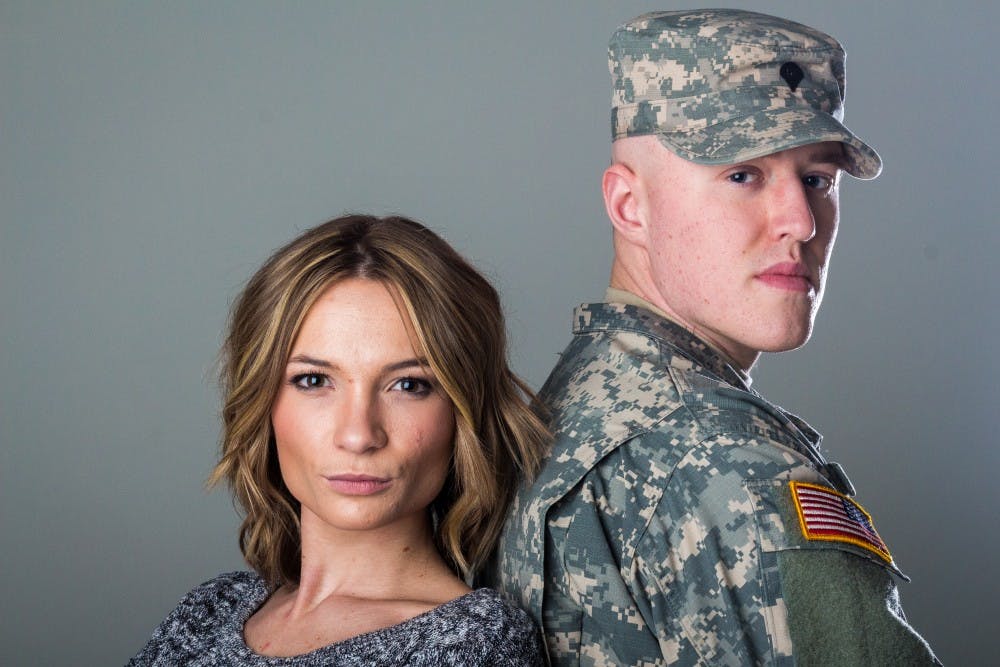Overcoming the odds: Army reserve, hockey player beats brain tumor with friend's and family's support

One phone call from his eye doctor changed Shayn Lindquist's life forever.
Only one week after he won the U.S. Army Reserve "Best Warrior Competition" his doctor informed him he had a brain tumor. He was diagnosed as having a germinoma — a common type of germ-cell tumor found in the pineal region in the center of the brain. These tumors often cause headaches, nausea and vomiting.
Lindquist didn't know how to live with cancer. But, he knew someone who did.
"Life is something you cannot take for granted," said Lindquist, of Clarkston. "In life, you are going to have some type of obstacle in your way. It's how you come out of it that defines you."
After finding out he had a tumor in his brain, Central Michigan Division II hockey player Shayn Lindquist told only three people about the disease: his mother, his father, and his best friend.
He told his friend, Lexington junior Katie Massaria, about his diagnosis. Massaria is a cancer survivor who beat Hodgkin’s Lymphoma. Her disease had been in remission for over a year, so Massaria offered to help Lindquist through his treatments.
“I am a very level-headed person who takes things at face value,” Massaria said. “He knew I had (cancer) before and was not going to sugarcoat anything. I told him this is going to be a hard experience you will have to go through."
Before beginning chemotherapy, Lindquist, a Central Michigan Division II hockey player, experienced severe headaches and blurry vision. His doctor said his eyesight was affected because of the position of the tumor in the center of his brain. Following his treatment, Lindquist's headaches have lessened and his vision has improved.
Lindquist still sees double when he looks straight and turns his eyes to the left. He now wears prism lenses to help his vision, which are used to reduce double vision and positional correction. In the future, he may receive a surgery to fix the problem.
The best thing about using the prism lenses, he said, is that they helped him get back on the ice. Lindquist stopped playing hockey when began his radiation treatment early in the Fall semester. His vision still complicates his play, he said. Sometimes, he sees two pucks when receiving a pass and has to determine what puck to go for.
The hardest part about the treatment, Lindquist said, was to stay positive.
"It is all mental," he said. "That's why my mom was there. Obviously, there were days where it was really hard mentally. My mom always was positive and she kept me in good spirits with her cheesy jokes."
Lindquist and his mother, who came to each of Lindquist's treatments and appointments, went in to get MRI results from his oncologist on Nov. 8. His oncologist told Lindquist that his treatment was a complete success — his tumor was gone.
"It was a huge relief," Lindquist said. "We can finally move forward and start looking past all of it."
Lindquist is back to doing what he loves; He is a dedicated member of the Army Reserves and he returned to practice in October after his treatments were finished. He played his first game back against Michigan Tech on Oct. 21.
"It was tough not being there on the ice," Lindquist said. "Hockey is a fun game and was a huge distraction to help keep my mind off my troubles when I was going through treatment."
Lindquist has switched his focus after his recent experiences, now wanting to find a way to inspire others and raise money for cancer research. His companion through his treatment believes he is stronger now after facing his health crisis.
"He did it so much better than I would have thought,” Massaria said. “I believe he has a better ability to handle life. The way he has handled all this proves he can handle anything that comes at him in life.”
Lindquist is doing a charitable ruck this spring to raise money for cancer research organizations — a ruck is when one carries heavy equipment in a backpack and climbs for miles.
Lindquist thought of the idea of a ruck from an army lieutenant, Nick Bare, who rucked 160 miles from Austin, Texas to Houston and raised $9,000 for hurricane relief. Lindquist's plan is to ruck 150 miles from Clare to the Mackinaw Bridge to raise money for St. Jude Children's Research Hospital and Special Days Camps, where cancer survivors can visit and experience traditional camping activities.
Lindquist volunteered at Special Days Camps to help others who were going through the same struggles.
“The camp meant a lot to me," Lindquist said. "It helped me take my mind off all the stuff I was going through and just have fun."
Ten people have agreed to ruck with Lindquist. All donations will be split 50/50 between the two organizations.
Lindquist said his initial goal is to raise $2,000, but he would like to see that number increase to $10,000 in the future.
The ruck will take place May 16-20. Participants will run about 30 miles each day. Lindquist's parents will be driving along with the group — hauling water and food.
Lindquist has a Facebook page, "Ruck for a Cure," with a GoFundMe page link available.





